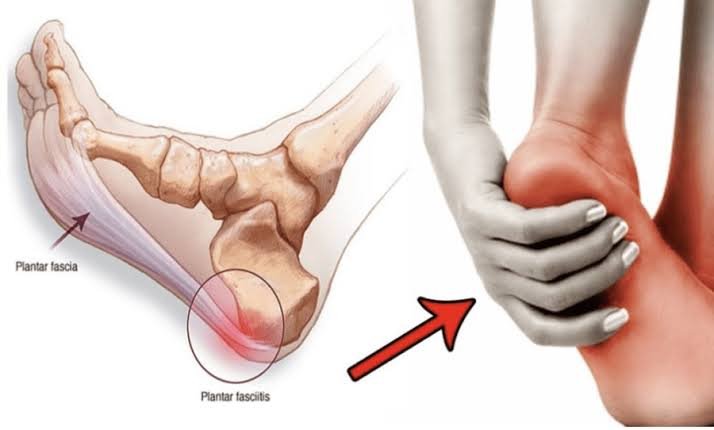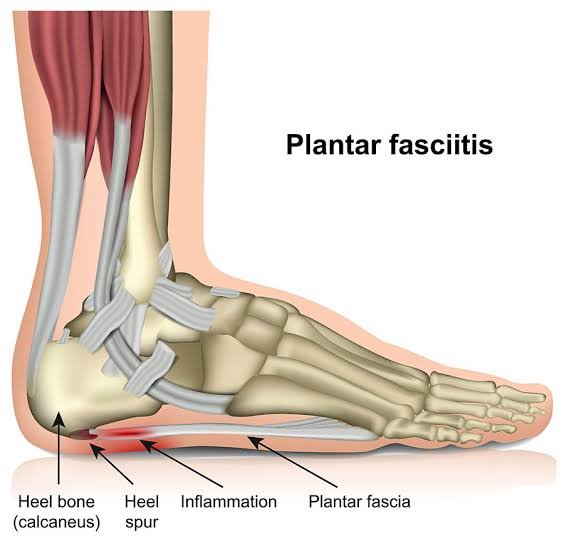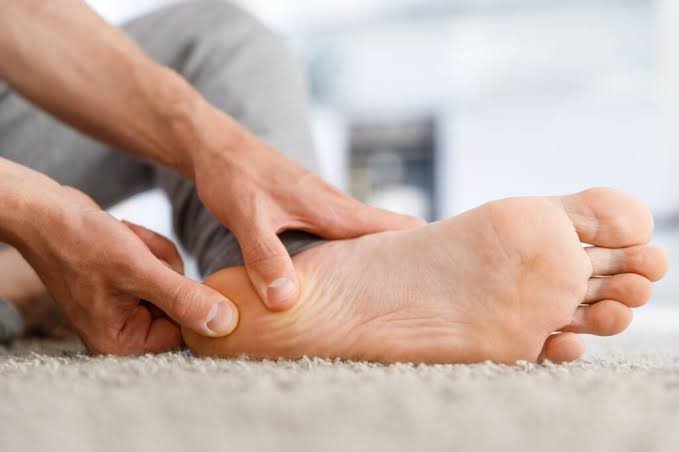Plantar fasciitis is one of the most common causes of heel pain. It involves inflammation of a thick band of tissue that runs across the bottom of each foot and connects the heel bone to the toes, known as the plantar fascia.
Plantar fasciitis commonly causes stabbing pain that often occurs with your first steps in the morning. As you get up and move, the pain normally decreases, but it might return after long periods of standing or when you stand up after sitting.
 Concept of Plantar Fasciitis acc to Ayurveda
Concept of Plantar Fasciitis acc to Ayurveda
Ayurveda considers it as Vatakantaka, condition resulting due to vitiation of vata along with other doshas and dathus. ‘Kantaka’ refers to the point of a needle which is like a thorn and that which produces a sharp, stinging pain at the heel of the foot.
Symptoms
Plantar fasciitis typically causes a stabbing pain in the bottom of your foot near the heel. The main symptoms are
- Stabbing pain in the bottom of foot near the heels.
- Pain usually worst with first few steps in the morning.
- Pain after long period of standing or rising from sitting.
- Running, walking or lifting heavy weight may exacerbate the condition.
Causes
The plantar fascia is a band of tissue, called fascia, that connects your heel bone to the base of your toes. It supports the arch of the foot and absorbs shock when walking.
Tension and stress on the fascia can cause small tears. Repeated stretching and tearing of the facia can irritate or inflame it, although the cause remains unclear in many cases of plantar fasciitis.
 Risk factors
Risk factors
Even though plantar fasciitis can develop without an obvious cause, some factors can increase your risk of developing this condition. They include:
- Age: Plantar fasciitis is most common in people between the ages of 40 and 60.
- Certain types of exercise: Activities that place a lot of stress on your heel and attached tissue — such as long-distance running, ballet dancing and aerobic dance — can contribute to the onset of plantar fasciitis.
- Foot mechanics: Flat feet, a high arch or even an atypical pattern of walking can affect the way weight is distributed when you’re standing and can put added stress on the plantar fascia.
- Obesity: Excess pounds put extra stress on your plantar fascia.
- Occupations that keep you on your feet: Factory workers, teachers and others who spend most of their work hours walking or standing on hard surfaces can be at increased risk of plantar fasciitis.
Complications
Ignoring plantar fasciitis can result in chronic heel pain that hinders your regular activities. You’re likely to change your walk to try to avoid plantar fasciitis pain, which might lead to foot, knee, hip or back problems.
 How Ayurveda prevent Plantar Fasciitis?
How Ayurveda prevent Plantar Fasciitis?
Ayurveda suggests following a healthy regimen that does not lead to the aggravation of doshas. As prevention is better than cure, it is suggested to avoid over exertion to the heels and to follow a region that does not vitiate doshas and dhatus. As a part of daily regimen Ayurveda highlights the importance of wearing proper foot wears, daily massage to foot etc. Avoid walking with foot placed on hard, uneven surface and exertion (physical activities like running, jumping, walking , sports and games) leads to the aggravation of vata. Avoid day sleep and night vigil.
Ayurvedic Panchakarma Treatment For Plantar Fasciitis
Main aim of our treatment is to normalise three dosha and to nourish the vitiated dhatus (tissues), also to reduce the pain and inflammation.
- Abhyanga – oil massage on the heels
- Swedana – Fomentation, especially Ishtika Sweda
- Avagaha – Foot dip in herbal oils
- Dhara – Dripping of medicated oil.
- Upanaha / Bandhana: Poultice and Bandaging
- Agni karma – Cauterization.
- Ishtika Sweda
- Virechana
- Basti
- Rakthamokshana
- Lepa
- Upanaha
 Panchakarma procedures:
Panchakarma procedures:
- Virechana (Purgation) – helps in eliminating vitiated pitta, vata and nourish asthi dhatu (bone)
- Basti (medicated enema) – using herbal oils or medicated milk helps in healing pain and inflammation by eliminating vata and nourishing asthi dhatu.
- Rakta mokshana (blood letting) – helps in relieving pain and inflammation.
- Ishtika Sweda (Brick fomentation) – This is one of the special treatments explained in Ayurveda which is extremely helpful in foot related pathologies like plantar fasciitis.
- Sneha dhara – In this medicated oils / ghee / oils and ghee are poured over the affected part for a fixed schedule of time period. Samvahana can be simultaneously done.
- Ksheeradhara – Medicated milk (milk processed with herbal drugs which have analgesic and anti-inflammatory properties or with decoctions prepared from the same drugs) is poured in streams over the affected part just is in Sneha Dhara. Milk processed with Dashamula, Laksha, Bala provides good relief.
- Lepa – (Application of herbal pastes)
Pastes prepared using the below said herbal powders can be used as applicants.
- Upanaha / Bandhana: Poultices and Bandaging
Poultices prepared by combining the above said churnas (mentioned in lepa) and oils mentioned in the context of Abhyanga can be used for applying analgesic and anti-inflammatory poultices. Bandages around the painful part too are helpful.
Ayurveda Medicines used
Kashaya –
- Rasnadi kashayam,
- Rasna erandadi kashayam
- Varanadi kashayam,
- Astavargam Kashayam
- Guggulutiktakam Kashayam
- Sahacharadi Kashayam
- Sahacharabaladi Kashayam
- Kokilaksham Kashayam
- Rasnasaptakam Kashayam
- Guluchyadi Kashayam
- Gandharvahastadi Kashayam
Ghritam –
- Guggulutiktakam Ghritam
- Varanadi Ghritam
- Rasnadi Ghritam
- Dhanwantaram Ghritam
- Tiktakam Ghritam
Vati/ Guggulu –
- Kaishora Guggulu
- Yogaraja Guggulu
- Panchatikta Ghrita Guggulu
- Ksheerabala Tailam 101 caps
- Dhanwantaram Tailam 101 caps
- Mahavata vidhwamsini Rasa
- Ekangaveera rasa
Abhyanga, Dhara and Avagaha:
- Murivenna
- Ashwagandhabala Lakshadi Taila
- Mahanarayana Tailam
- Ksheerabala Tailam
- Prabhanjanavimardana Tailam
- Pinda Tailam
- Kottamchukkadi Tailam
- Sahacharadi Tailam
- Dhanwantaram Tailam
Lepa
- Rasnadi churnam
- Kottamchukkadi churnam
- Grihadhumadi churnam
- Ellumnishadi churnam
- Jatamayadi churnam
Diet Adaptation In Plantar Fasciitis
Diet to be taken-
Vegetarian diet
- Pumpkin seeds, white beans
- Green leafy vegetable like cabbage, spinach
- Soya food
- Ladies finger, beans, carrot, beets, onion
Non – Vegetarian Diet
- Chicken
- Egg
- Rooster and fish
Other Diet:
- Horse gram, black gram, sesame seed, flax seed
- Garlic, betel leaves, basil
- Red colored rice
- Fruits like orange, pomegranate, berries, mango
- Ghee
- Rasins, almonds, dates
- Include cinnamon, long pepper, garlic, ginger in the diet.
Food To Avoid In Plantar Fasciitis
- Sugar
- Processed grain
- Saturated fat
- Fried and fast food
- Excess hot, sweet and spicy food
- Refrigerated food and ice creams
- Cow pea, pea nut, Indian bean, Bengal gram
- Beverages and soft drinks
Lifestyle and home remedies
To reduce the pain of plantar fasciitis, try these self-care tips:
- Maintain a healthy weight. Extra weight can put extra stress on your plantar fascia.
- Choose supportive shoes. Buy shoes with a low to moderate heel, thick soles, good arch support and extra cushioning. Don’t wear flats or walk barefoot.
- Don’t wear worn-out athletic shoes. Replace your old athletic shoes before they stop supporting and cushioning your feet.
- Change your sport. Try a low-impact sport, such as swimming or bicycling, instead of walking or jogging.
- Apply ice. Hold a cloth-covered ice pack over the area of pain for 15 minutes three or four times a day to help reduce pain and swelling. Or try rolling a frozen bottle of water under your foot for an ice massage.
- Stretch your arches. Simple home exercises can stretch your plantar fascia, Achilles tendon and calf muscles.
PACKAGE INCLUDES
- Initial Consultation with Ayurveda Doctor and daily follow up consultation
- Accommodation
- All Ayurvedic Meals (Breakfast, Lunch & Supper) & herbal drinks
- Advice on Diet & Lifestyle Management
- Ayurveda Therapies – Customized for each client.
- Yoga (once a day – Yoga Asanas, Breathing, Meditation and Relaxation)
RESERVATION DETAILS:
- We are committed to keep up the quality of our treatment programs and we take only a limited number of patients each month.
- So we advise you to reserve your treatment programs a minimum one month in advance.
- The 50% charges of the treatment programs should be paid in advance to reserve the treatment programs.
- The advance deposit will be deducted from the total treatment programs and the balance must be paid on the first day of the treatment program.


